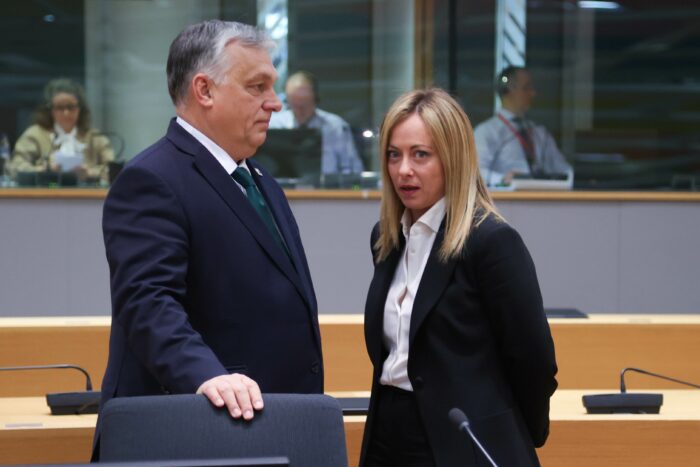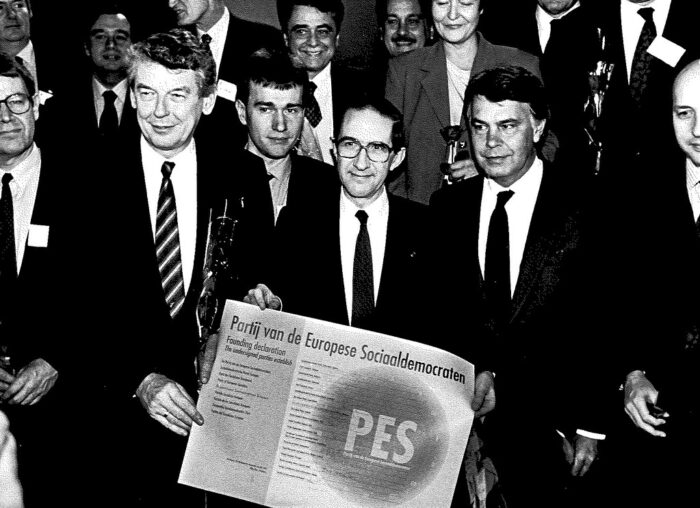The Progressive Post
Christian Democracy’s crisis is bad for everyone – including the left

Europe’s leading Christian Democratic parties are currently facing a major crisis as they lack principled leadership and programmatic vision. A major risk is that they respond to this crisis by emulating authoritarian political projects.
Christian Democratic parties have historically been among the most important political forces in western Europe. Parties such as the German CDU, the Austrian People’s Party (ÖVP) and, at least until its dramatic dissolution in 1994, the Italian Democrazia Cristiana (DC), have for decades defined the meaning of centre-right politics on the continent. After 1945, they successfully committed members of anti-democratic and reactionary milieux to constitutional democracy. This was crucial for the stabilisation of the European post-war order. Christian Democratic parties also played a key role in initiating the process of European integration. And, at least until the mid-1980s, they supported many social policies that resonated with workers and enabled collaborations with the left, as in the many successive centro-sinistra ‘organico’-coalition governments in Italy.
The Christian Democratic parties of the past were no doubt internally heterogenous groupings without a single, clear-cut agenda. This was not a bug but a feature of classic Christian Democracy. Some Christian Democratic politicians indeed took pride in the fact that their parties did not pursue grand ideological projects. For example, Josef Hermann Dufhues, who in the 1960s acted as the CDU’s executive chairman, argued that party manifestos are “little more than a secularised and tactically embellished creed, which is only needed by those who otherwise have no world view”. Dufhues believed that Christian Democrats should be guided by their Christian values and a concern for resolving citizens’ concrete problems. They should strive to achieve compromises between different societal interests and occupy a position in the political centre. Accordingly, Christian Democracy of the 1960s and 1970s was generally a centrist or centre-right enterprise, and its advocates were mostly committed democrats. Occasionally, Christian Democratic politicians pandered to citizens who sympathised with the far right. And some conservative Christian Democrats retained sympathies for authoritarian leaders. Yet these were hardly representative of Christian Democracy as a whole (although this ‘dark’, more authoritarian side of Christian Democracy never vanished entirely).
The few genuinely Christian Democratic parties that still exist today, most notably the German CDU and the Austrian ÖVP, are struggling to position themselves ideologically. One problem both parties have in common is that for many years they have relied heavily on the capacity of popular political leaders to mobilise electoral support, while neglecting the question of what their parties should stand for, over and above being organisations with leaders that voters like and trust.
Seen in this light, the problem facing the CDU is not so much that Angela Merkel’s 16-year-long chancellorship has made the party too centrist or ‘un-conservative’, as critics allege – but that hardly anyone seems to have put any thought into what German Christian Democracy without Merkel could be. The fact that Merkel’s successor Friedrich Merz is himself pursuing a centrist line after repeatedly promising a pronounced shift to the right suggests that he had no clear idea of what the CDU should aspire to be, either. For the ÖVP, the challenge is different but equally serious: the short-lived but virtually all-encompassing reliance on the person of Sebastian Kurz (and his close circle) between 2017 and 2021 has engulfed the party in a crisis of corruption that has damaged its public image. Given that within the party seemed prepared for a post-Kurz era, neither a programmatic plan B, nor an alternative leader were available when Kurz stepped down in autumn 2021.
Why exactly is it problematic that contemporary Christian Democratic parties lack a sharp ideological profile? After all, this clearly did not harm them in the past. For one thing, it must be borne in mind that having ‘no clear-cut agenda’ in, say, the early 1960s, meant something very different from what it means today. Back when Josef Hermann Dufhues forcefully rejected party manifestoes, general appeals to the importance of upholding and acting in accordance with ‘Christian values’ still made a great deal of sense to voters. Christianity was more than a vague culturalist catchword; there were still many practising Christians around, who would more or less reliably turn out for parties that presented themselves as Christian. Moreover, implicit in the rejection of broad ambitious agendas was a repudiation of a particular image of socialism or communism – one according to which the aspiration to create a fundamentally new and radically egalitarian society almost inevitably leads to repression and totalitarianism. In the cold war era, this had considerable resonance among western European electorates. In a sense, then, earlier Christian Democrats did actually have a political agenda, albeit a somewhat broad one that was often couched in terms of a non-agenda with strong anti-communist undertones.
For another thing, at the dawn of the 2020s, neither generic appeals to ‘Christian values’, nor a firm anti-socialism are likely to entice voters. The ideological vacuum created by the absence of capable leaders (who temporarily managed to veil the parties’ lack of direction) must be filled with new ideas that cannot therefore simply be retrieved from the past. In the process of exploring what those new ideas could be, however, Christian Democrats have become vulnerable to the influence of anti-liberal and authoritarian political entrepreneurs – notably Hungary’s Prime Minister Viktor Orbán – who claim to have an ambitious political vision that is consistent with classic Christian Democracy. Unlike western European Christian Democrats, Orbán and his followers have for more than a decade invested great efforts and energies in the production of ideology. And they have managed to convince several leading Christian Democrats at the EU level and in domestic political spheres that what sociologist Dorit Geva describes as “authoritarian and hyper-nationalist neoliberalism” represents a genuine revival of Christian Democracy. The undeniable strength of Orbán’s political project is that it is, well, a project – and an electorally successful one at that. In an age where the far right seemingly poses the most serious electoral threat to the centre-right, it may well be that Christian Democrats begin copying more and more elements from the Hungarian script. This is bound to put their laudable post-war achievements in jeopardy, destabilising liberal democracy and ruling out any constructive collaboration with the left.
Photo credits: Mirko Kuzmanovic/Shutterstock.com




